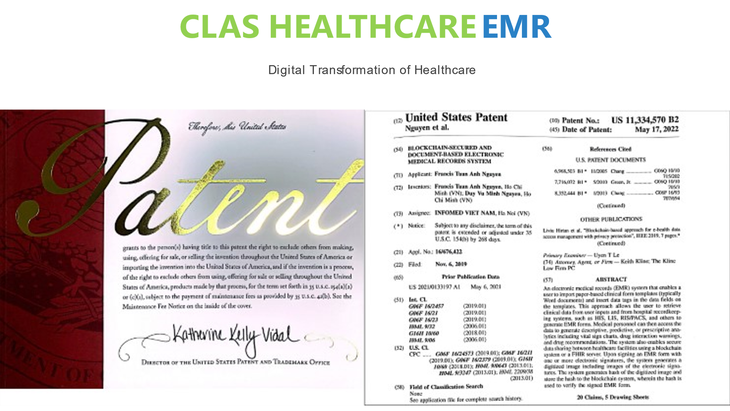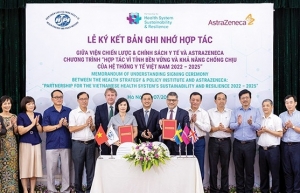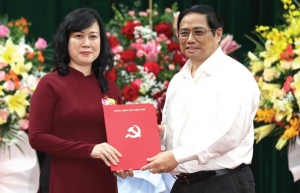INFOMED Vietnam wins the world’s first patent for electronic medical records
EMR is applicable at hospitals, private clinics, and community health centres, facilitating doctors, nurses, and managers in increasing treatment efficiency and safety for patients. The solution is customised for numerous hospitals and clinics and applied in Hanoi, Thua-Thien Hue, Khanh Hoa, and Dong Nai provinces.
Nguyen Francis Tuan Anh, chairman of INFOMED Vietnam said, “It was a great honour when our EMR solution was validated and recognised by the most prestigious patent granting federal agency in the US. With this innovation, the doctor-patient relationship is more connected from various perspectives. We are proud that this Vietnamese product meets international standards and excels compared with other medical information software of the world.”
 |
| The patent blockchain-secured and document-based EMR system from United States Patent and Trademark Office (USPTO) has been granted to INFOMED |
The blockchain-secured and document-based EMR system is expected to not only benefit hospitals but also patients. It offers top-level medical data security, the ability to apply electronic and many kinds of digital signatures, meeting standards set by the Vietnam Ministry of Health (MoH) and strictly aligning with the Fast Healthcare Interoperability Resources (FHIR) and Health Insurance Portability and Accountability Act of the US. In addition, it applies machine learning and AI for data analysis
Moreover, it can directly connect and be integrated with medical devices and existing management, laboratory, and communication systems.
An EMR system enables a user to import paper-based clinical form templates and insert data in the fields on the templates. This approach allows the user to retrieve clinical data from user inputs and hospital records. Medical personnel can then access the data to generate descriptive, predictive, or prescriptive analytics including vital sign charts, drug interaction warnings, and drug recommendations.
The EMR patent also marks an important hallmark in the sector’s digital transformation. According to the MoH, there are some fields that the sector gives priority in its digital transformation journey, with the deployment of EMR at all health facilities in line with the roadmap set in Circular No.46/2018/TT-BYT from 2018 towards paperless hospitals.
Under the roadmap, between 2019 and 2023, health facilities of level 1 and higher must upgrade their IT systems to facilitate the deployment of EMR. Meanwhile, other health facilities based on their demands and practical capacity will make necessary preparations for EMR. In the 2024-2028 period, all health facilities nationwide have to deploy EMR.
The blockchain-secured EMR enables secure data sharing between healthcare facilities using a blockchain system or an FHIR server. Upon signing an EMR document with one or more electronic signatures, the system generates a digital image including electronic signatures. The system generates a hash of the digitised image and stores it on a blockchain, wherein the hash is used to verify the signed EMR document.
Globally, there are rather many health facilities and organisations applying blockchain in providing services for users. In Vietnam, there are some EMR systems developed by medtech firms. However, INFOMED's is the first which applies blockchain to EMR, ensuring maximal security for medical data.
| The USPTO is the federal agency for granting US patents and registering trademarks and advises the president of the US, the secretary of commerce, and government agencies on intellectual property policy, protection, and enforcement; as well as promotes stronger and more effective IP protection around the world. Annually, the USPTO grants about 150,000 patents to organisations and individuals globally. |
| Initially generated for application in hospitals, the EMR system of INFOMED has been developed for other health facilities. By utilising state-of-the-art technology, it is recognised as a promising solution that positively contributes to the digital transformation in the healthcare sector, enhancing the quality of examination and treatment of Vietnamese people. |
 | Health financing tops response priorities In light of profound pandemic impacts, Vietnam is moving to cooperate with international stakeholders to increase the sustainability and resilience of the health system, with health financing being among the top priorities ahead. |
 | Key priorities for healthcare sector amid challenging time Many people have asked me why I dared to take the position as Minister of Health at this time, especially when I do not have a medical professional background. However, with the role and responsibility of a party member and especially with the trust of members of the Party Central Committee, I strictly obey the assignment of the Party and State. |
 | Healthcare pros call for legal advances in telehealth Despite strong interest among medtech businesses and hospitals, the legal framework for telehealth performance in Vietnam remains incomplete, making the amendment to the Law on Medical Examination and Treatment an ever-urgent need. |
 | Transforming healthcare through 5G Key findings within Ericsson’s ConsumerLab report, titled “From Healthcare to Homecare”, have outlined the potential of 5G to transform the healthcare sector globally and in Vietnam. |
What the stars mean:
★ Poor ★ ★ Promising ★★★ Good ★★★★ Very good ★★★★★ Exceptional
Themes: Healthcare Platform
- PM outlines new tasks for healthcare sector
- Opella and Long Chau join forces to enhance digestive and bone health
- Hanoi intensifies airport monitoring amid Nipah disease risks
- Cosmetics rules set for overhaul under draft decree
- Policy obstacles being addressed in drug licensing and renewal
Related Contents
Latest News
More News
- Agro-forestry and fisheries exports jump nearly 30 per cent in January (February 09, 2026 | 17:45)
- Canada trade minister to visit Vietnam and Singapore (February 09, 2026 | 17:37)
- New tax incentives to benefit startups and SMEs (February 09, 2026 | 17:27)
- Vietnam forest protection initiative launched (February 07, 2026 | 09:00)
- China buys $1.5bn of Vietnam farm produce in early 2026 (February 06, 2026 | 20:00)
- Vietnam-South Africa strategic partnership boosts business links (February 06, 2026 | 13:28)
- Mondelez Kinh Do renews the spirit of togetherness (February 06, 2026 | 09:35)
- Seafood exports rise in January (February 05, 2026 | 17:31)
- Accelerating digitalisation of air traffic services in Vietnam (February 05, 2026 | 17:30)
- Ekko raises $4.2 million to improve employee retention and financial wellbeing (February 05, 2026 | 17:28)

 Tag:
Tag:























 Mobile Version
Mobile Version